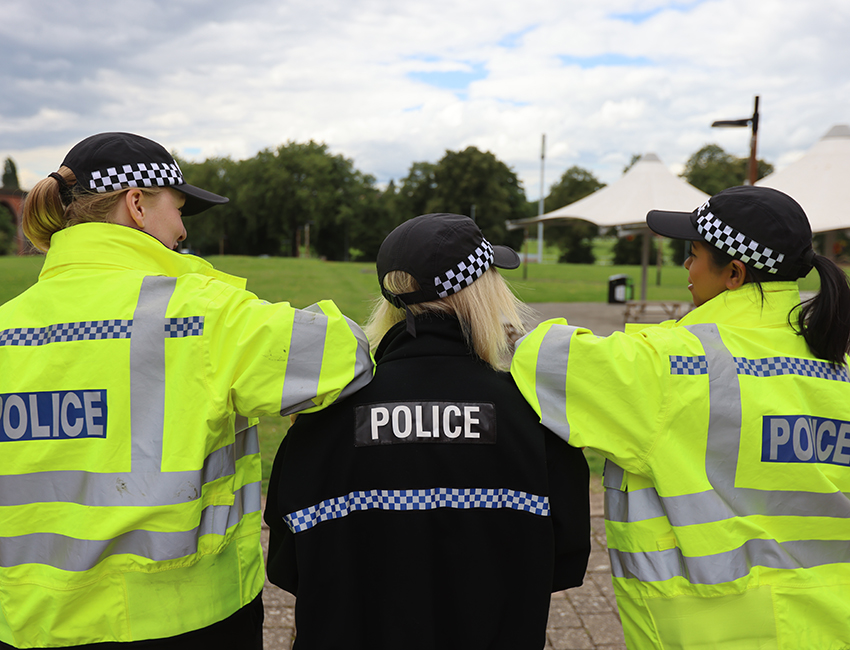This degree will support you to apply to join the police service via the College of Policing PPD entry route, or for any other graduate role within criminal justice and law enforcement. You'll develop specific police skills, knowledge and critical understanding of policing in the 21st century, with opportunities to put knowledge into practice during simulation exercises.
of students are in work and/or further study 15 months after graduating
of students were positive about the teaching on the course
This is the only qualification which enables you to apply for the ‘pre-degree' (PPD) entry route into the Police Service in England and Wales, and meets the professional requirements for policing in the 21st century.
University of the Year finalist
Recognised for our graduate success, we’re shortlisted for University of the Year in the Times Higher Education Awards 2025.
Overview
Our Degree in Professional Policing (PPD) is licensed and validated by the College of Policing, the professional body for policing in England and Wales. This degree is suitable for students wishing to pursue a career in policing or other law enforcement and investigative roles, such as: the National Crime Agency, Probation Service, Prison Service, local authority, banking and similar organisations where investigative or practical legal knowledge are required.
You'll study topics such as response policing, community policing, public protection and criminal investigation strategies and techniques, including suspect interviewing. You’ll also explore how policing and criminological concepts can explain, prevent and detect crime, criminality and victimisation, and how these underpin both criminal justice practice and policing practice in England and Wales. There'll be plenty of opportunities to practice applying your new knowledge in simulated practical policing scenarios on campus and at the local West Mercia Police Headquarters, whilst wearing the police uniform, to really give you an immersive learning experience.
We work closely with the University's local police force, West Mercia Police, to support the delivery of this programme. You'll have unique access to West Mercia Police Headquarters Training Facilities and operational staff and officers, who regularly visit the campus to demonstrate equipment. You'll also be able to access the University's own mock courtroom in the School of Law, and Conference Facilities where the Policing Team convene a number of public lectures, helping you to meet and network with local policing professionals and employers.
Volunteering opportunities
You'll be actively encouraged and supported to apply for volunteering roles during your time with us. Many students choose to volunteer with West Mercia Police, via the Citizens in Policing programme or with charity/volunteer/not-for-profit organisations such as Youth Support Services (YSS) or Victim Support.
You'll benefit from online access to Policing Career opportunities, including advice and information on police forces and law enforcement agencies open for recruitment and also available volunteering opportunities. Recent opportunities have included Appropriate Adult roles on behalf of the YSS, which provide students with experience in police custody suites and police suspect interviewing, and also opportunities with the NHS Mental Health Crisis Line.
We maintain an excellent working relationship with the West Mercia Police Citizens in Policing Team (volunteer programme), which means our policing students are offered bespoke and early access to volunteering opportunities within West Mercia Police before they are released to the general public. In addition, you'll be supported throughout your application for the West Mercia Police Special Constabulary, should you choose to volunteer as a Special Constable alongside your studies.
Professional Policing at Worcester
Course content
Our courses are informed by research and current developments in the discipline and feedback from students, external examiners and employers. Modules do therefore change periodically in the interests of keeping the course relevant and reflecting best practice. The most up-to-date information will be available to you once you have accepted a place and registered for the course.
All modules are mandatory to ensure you meet the professional requirements for policing.
We regularly review our courses to reflect the latest research and developments in the subject area, as well as feedback from students, employers and the wider sector. As a result, modules may change to ensure the course remains current and relevant.
Careers
As an approved and licensed qualification from the College of Policing, our degree will allow you to pursue a career in policing.
This degree could be the first step toward your career as a:
- Police Constable
- Police Community Support Officer (PCSO)
- Civilian Investigation Officer (CIO)
- Criminal investigator
- Crime analyst
- Cybercrime investigator
- Prison officer
- Crime scene investigator
- Intelligence analyst
- Civil Service officer
Please note: studying this degree does not guarantee entry into a police service as a police officer. This degree provides you with the academic entry requirements for an application for the pre-join degree route into policing. Each police force in England and Wales sets its own recruitment process and selection criteria, with entry requirements varying between forces. Your education will continue ‘in force’ if you become a probationary police constable upon successful application. If you wish to use a pre-join degree as your entry route to the police service, you must apply to join a police force within five years of your graduation. For further information about applying to the police service, please visit the College of Policing website.
Student stories
Course highlights
Teaching and assessment
You’ll be taught through a combination of interactive lectures, workshops, and seminars.
You'll also practice applying your new knowledge in simulated practical policing scenarios on campus and at the local West Mercia Police Headquarters, whilst wearing the police uniform, to really give you the immersive learning experience.
Teaching and assessment contents
Teaching is research led; the National Police Curriculum is developed and augmented by staff who have researched and written extensively on many areas of policing, from the history of policing and police leadership, multi-agency partnerships, public order and the hidden aspects of police corruption and deviance. Teaching will relate to real-world examples and ‘lived experiences’, whether in relation to police practice, the behaviour of individuals or the specifics of legislation, policy, procedures and strategies and implementation of such into practice. The teaching team will draw on relevant research, analysis and evaluation, use current literature such as Serious Case Reviews, government and policing reports, world news and social media publications and wider media sources, such as documentaries and podcasts, to consider and introduce alternative views, perspectives and evidence within the examination of policing and the wide, diverse and far-ranging societies and communities it serves. Teaching aims to encourage and support students to take responsibility for their own learning, to become increasingly independent and autonomous in their academic and professional development. This approach further seeks to foster an understanding and adoption of a lifelong approach to learning, firmly embedded in professional practice.
Teaching is fundamental in attaining this realisation through the integration of reflective practice throughout the programme across academic years. Theoretical modules provide the underpinning knowledge and intellectual skills as a foundation for both evidence-based practice and academic development. Students on the PPD will not be taught in isolated ‘policing only’ lectures; they will join inter-disciplinary modules (Law, Criminology and Sociology) throughout their degree studies so as to benefit from peer learning and differing perspectives to policing issues in order to further advance evidence based practice within their policing studies. This link with other academic disciplines, student bodies and Criminal Justice communities within a safe, learning environment is designed to encourage multi-agency working, broader thinking and enhance understanding of the wide reach of policing issues and strategies. This methodology is also designed to enhance communication skills between disciplines and encourage involvement of broader concepts in the design of evidence-based policing initiatives and research areas. Policing is not an isolated service in today’s modern society and therefore, those studying Professional Policing will also not be isolated from associated communities within the University student body.
Teaching adopts a blended, approach combining face to face, on campus learning with synchronous and asynchronous teaching sessions to creates a stimulating, flexible and exciting learning experience for students. Formal lectures and seminars are complemented by a ‘flipped classroom’ approach, a blended learning strategy that reverses traditional learning. It is an active learning approach that requires students to complete a range of pre-reading of key information provided via the VLE, prior to attending lectures, which then forms the basis of in-class discussion, activities, and projects.
Simulation opportunities provide a teaching methodology to bridge theory and practice and are designed to enable students to understand and interpret the application of theory in a safe practice environment. Simulation allows students to discover ways in which the theory helps them to tackle real world policing situations, engage in professional and ethical practice and to develop practical skills in a safe and supportive environment. In these simulations, students broaden their learning and experience, being able to take risks, make mistakes, evaluate alternative policing approaches, and hone skills in a safe learning environment. It also allows students to address their learning needs which cannot be assured in the opportunistic learning environment provided in the role of a front-line police officer. Simulation will be undertaken in environments as close to reality as possible, utilising wider University Schools and facilities including the Medical Training Facilities, where students will take part in an inter-disciplinary simulation involving nursing students, in tackling confrontational patients, mental health patients and uncooperative, intoxicated patients where human volunteers, experienced actors and mannequins will simulate patients. This approach allows students to engage in experiential learning closely aligned to their levels of knowledge and experience as well as preparing them for future multi-agency and interdisciplinary police incidents with competing priorities posing ethical dilemmas. Simulation will enhance student competence and confidence; it also promotes and develops the sense of professionalism.
In addition, meetings with Personal Academic Tutors are scheduled on at least four occasions in the first year and three occasions in each of the other years of a course. Students are also able to access tutorials with the module team and final year dissertation supervision. The University places emphasis on enabling students to develop the independent learning capabilities that will equip them for lifelong learning and future employment, as well as academic achievement. A mixture of independent study, teaching and academic support from Student Services and Library Services, and the Personal Academic Tutoring system enables students to reflect on progress and build up a profile of skills, achievements and experiences that will help them to flourish and be successful.
Meet the Team
A small selection of the School of Law lecturers who teach on this course.
Entry requirements
UCAS tariff points required: 104
| Qualification | Grade |
|---|---|
| A-level | BCC |
| BTEC National Extended Diploma | DMM |
| T-level | Merit |
We do accept Access to HE Diplomas and other qualifications which may not exactly match the combinations above. Work out your estimated points with the UCAS tariff calculator.
Any questions?
If you have any questions about entry requirements, please call our Admissions Office on 01905 855111 or email admissions@worc.ac.uk.
Fees
Fees contents
UK and EU students
In 2026/27 the standard fee for full-time home and EU undergraduate students on BA/BSc/LLB degrees and FdA/FdSc degrees is £9,790 per year.
Tuition fees are reviewed annually and may increase each year for both new and continuing students.
For more details on course fees, please visit our course fees page.
International students
In 2026/27 the standard tuition fee for full-time international students enrolling on BA/BSc/LLB degrees and FdA/FdSc degrees is £17,200 per year.
Tuition fees are reviewed annually and may increase each year for both new and continuing students.
For more details on course fees, please visit our course fees page.
How to apply
How to apply contents
Applying through UCAS
UCAS is the central organisation through which applications are processed for full-time undergraduate courses in the UK.
Read our how to apply pages for more information on the application process, or if you’d like to apply for part-time study.
Professional Policing BA (Hons) - N499
Contact
If you have any questions, please get in touch. We're here to help you every step of the way.

Michelle Clarke
Head of the School of Law, Senior Lecturer in Policing, Professional Policing Course Lead, University Safeguarding Lead (Students)
Michelle.clarke@worc.ac.ukAdmissions Office
admissions@worc.ac.uk01905 855111More to explore
Open Days
Visiting us is the best way to get a feel for student life at the University of Worcester.

The City of Worcester
Worcester is a welcoming university city with great transport links and plenty of student parking.

Accommodation
Benefit from our accommodation guarantee. We have rooms on campus to suit every budget including en-suite options.













